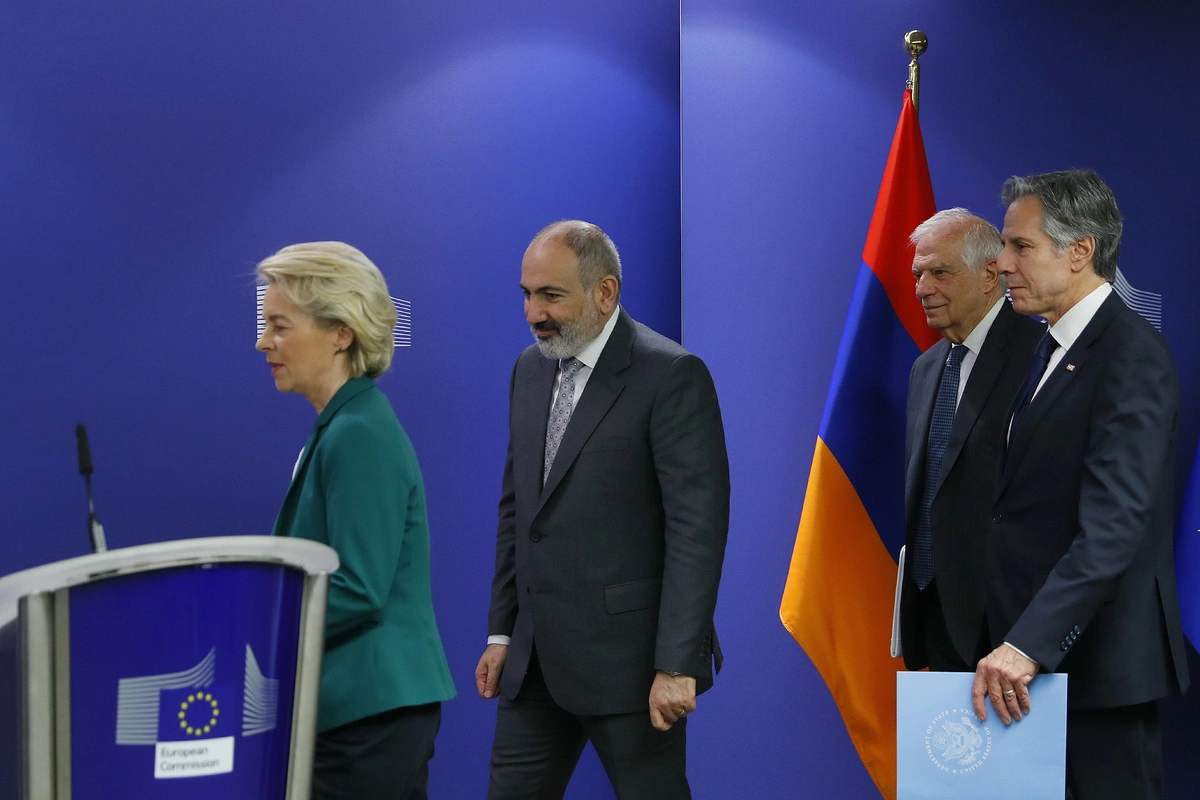
On 5 April, Armenian Prime Minister Pashinyan, European Commission President von der Leyen, and U.S. Secretary of State Blinken met to assist Yerevan in enhancing its economic resilience and diversification as it moves further away from traditional patron Russia.
Image: primeminister.am
As announced in a joint statement released by Armenian Prime Minister Nikol Pashinyan and European Commission President Ursula von der Leyen on the sidelines of the European Political Community meeting in Granada last year, the two leaders met again on Friday with U.S. Secretary of State Antony Blinken. The joint event in Brussels to support the Armenian government came as Yerevan faces the daunting task of diversifying its economic and security dependency on Moscow.
Azerbaijan, Russia, and Türkiye all criticized the meeting, warning that it could destabilize the region and disrupt progress toward normalizing relations between Baku and Yerevan. Whether such claims are true remains to be seen, but hopes were high for substantial economic assistance and even military support. Following the meeting, it appears that those expectations were left unmet.
Opposition media even reported that Pashinyan left disappointed, claiming he expected “billions of dollars” in aid rather than the slightly over $350 million announced. That figure includes €270 million from the EU to be disbursed over the next four years, while the U.S. will provide an additional $65 million in assistance.
Though Yerevan has stated that its membership of the Russia-led Collective Security Treaty Organisation (CSTO) has been ‘frozen,’ and as it seeks to find new patrons, the gamble might not be paying off. Members of Pashinyan’s own Civil Contract have in recent weeks expressed concerns that there is nothing to offset any departure from the Eurasian Economic Union (EAEU), Moscow’s response to the EU. Yerevan controversially joined the bloc under former President Serzh Sargsyan instead of signing a European Union Association Agreement (EU AA) in 2013.
Given that Armenia relies almost solely on subsidized Russian gas sold at well below market prices, that seems understandable. Around 40 percent of Armenian exports head for the Russian market, while financial remittances alone reached $3.6 billion in 2022. Any reactionary and punitive action by Moscow could economically devastate the country and fuel significant social tensions.
But that is why last week’s meeting was considered of such importance in light of such potential shocks. Its purpose, the EU explained, was to “provide further assistance to help the country mitigate risks, diversify its trade, and strengthen its economic and institutional resilience.” As such, it was at least a first step in a likely long and arduous journey towards a still uncertain future.
Some commentators and analysts have already pointed out that in order to benefit from the European market, Armenian goods would first have to meet stringent EU quality requirements to export to a highly competitive market. Unlike Georgia, which did sign its AA, Armenia also has closed borders with two of its four neighbours, including Türkiye, a major obstacle to diversifying markets. That limits direct foreign investment, as does the absence of a peace agreement with Azerbaijan.
The EU and the U.S. seemed cognisant of that in Brussels, stressing the importance of normalizing relations with Azerbaijan and unblocking regional communications, though reference to Pashinyan’s "Crossroads of Peace” remains fraught with problems as the issue remains inseparable from geopolitical competition in the region. The same is true for nuclear safety, which was reportedly on the agenda, in the form of the future of Armenia’s aging Metsamor reactor.
While that could allow the country to continue producing and exporting electricity, even alongside renewables through the Black Sea Submarine Cable, it is unlikely to reduce dependency on Russia and likely require Azerbaijan’s acquiescence, too.
Such a possibility seems unlikely given Baku’s position on the Brussels meeting, especially since Armenia reportedly presented a list of military equipment purchased by Azerbaijan. If the hope was that military assistance from the European Peace Facility (EPF) would be announced then the call fell on deaf ears. EPF support would likely be minimal in monetary terms and restricted to non-lethal equipment and training, as it is in Moldova and Georgia.
Unlike last year’s controversial Granada statement, there was even no mention of expediting and ensuring the right to return of displaced ethnic Armenians to Karabakh. Instead, von der Leyen promised to aid their “long-term integration in Armenia,” starkly contrasting with other EU proclamations on their return. Blinken only mentioned regional integration as a “key to security and prosperity” in that context.
Nonetheless, Azerbaijan still fears that the Brussels meeting could bolster Armenia in holding out on what Yerevan considers to be unilateral concessions.
But last week’s high-level meeting might be impactful in other ways. Though many hopes have been dashed, in the context of declining ratings and some opposition to the return of the non-enclave villages, Pashinyan does need something to spin as a success given what many consider to be his considerable failures. In that sense, it was at least an endorsement of his rule and a commitment to supporting his government in the coming years.
But the elephant in the room remains. Though welcoming the meeting, one publication stressed that regardless of last week’s meeting, the need to normalize relations with Azerbaijan remains as pressing as ever. The first sign of that, perhaps, will be what happens next in talks to demarcate their shared border.
Share on social media